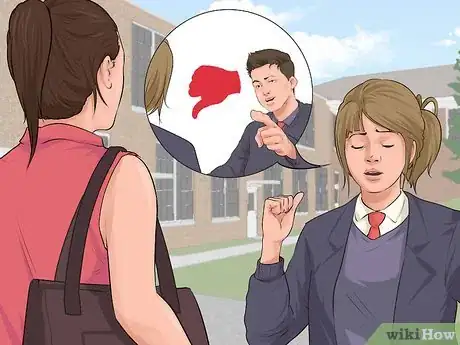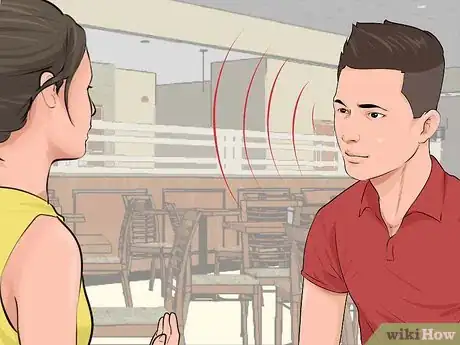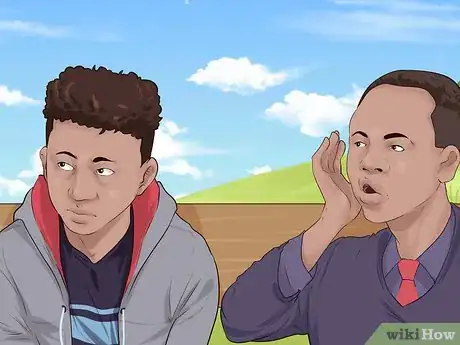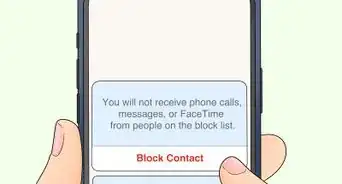This article was co-authored by Sheila A. Anderson. Sheila A. Anderson is a Certified Image Consultant, International Branding Icon, and the Founder of Image Power Play, an impression management and personal branding company. With over three decades of experience, she specializes in empowering corporate professionals to raise their personal image to meet the value of their brand. Sheila is a Certified Image Consultant with The Image Resource Network and a Certified Universal Style Consultant with The Universal Style International. Sheila is a member of the C-Suite Network Advisors and the author of the book, I.C.U., The Comprehensive Guide to Breathing Life Back Into Your Personal Brand.
There are 15 references cited in this article, which can be found at the bottom of the page.
This article has been viewed 145,326 times.
Everyone has annoying behaviors and gets on each other’s nerves from time to time. This even goes for good friends. Good friends should accept you for who you are, but you may also want to learn some strategies to not be annoying. You could improve your conversation skills, have good manners, or pay more attention to others. Working to improve your social skills will help build stronger relationships with your friends, and will also help you have more fun together.
Steps
Improving Your Conversational Skills
-
1Find interesting conversation topics. Talk about things you think would be of interest to your group of friends. Even though you may find one topic interesting, keep in mind that your friends might not, so avoid monopolizing the conversation. Current events, favorite movies or celebrities can all be good options.[1]
- Put the focus of the conversation on others rather than yourself and ask them questions about their lives and interests.
- For example, if your friends are big football fans, you could ask, “What did you think of the game last night?” Or you could talk about a recent shared activity: “Nicole’s party was great, wasn’t it?”
- Don’t gossip. Gossiping can damage your relationships and reputation. Before you start talking about someone else, ask yourself "Is what I'm about to say harmful or helpful?" If its not helpful, don't say it.
- If you have a significant other, don’t overshare about your relationship. It makes other people who aren’t in a relationship feel bad, and most people get tired of hearing you talk about it after a while.
-
2Know when to be quiet. Sometimes people can get caught up in the excitement of hanging out with their friends and forget to let others get a word in edgewise. Make sure you are giving others space to talk and avoid holding court for too long.
- Know when you are monopolizing the conversation and people are becoming bored. Good indicators are people avoiding eye contact with you, beginning to turn away, or chat amongst themselves.[2]
- Don’t talk just to talk or fill dead air. Learn to be comfortable with silence. If silence makes you uncomfortable, you might want to look into learning meditation or spending some time alone with your thoughts in silence.[3] Walk or study without headphones or background music.
Advertisement -
3Talk about what you know, but don’t be a know-it-all. Even if you truly are the expert in a particular topic among your circle of friends, do not act that way. No one likes to be corrected or lectured at. Everyone has something to contribute to the conversation, even a beginner.
- Don’t brag about your accomplishments. If people are interested, they will ask you about them.
- If you don’t know about a topic, don’t pretend that you do. Ask questions instead. People love to share their knowledge about something they care about.[4]
- You could say, “I think it’s so cool that you’re interested in artificial intelligence. I know a little bit about it, but not much. Could you recommend any good websites about it?”
-
4Listen. When someone else is talking, be an active listener. Stay present and show interest in what the other person has to say. Face them and make eye contact while they're talking. When they're done, repeat and summarize what they said to show that you understand.
- One of the best things you can do for a friend is listen to them. Listening helps strengthen your friendship and build empathy. [5]
- If you’re prone to talking too much, ask your friends questions about themselves. Most people love to talk about themselves. Ask open-ended questions instead of yes/no questions. For example, “Tell me about your trip to Spain!” is better than “Did you have fun in Spain?”[6]
- If your friend comes to you with a problem, don’t jump in and give them advice on how to fix it (unless they ask for it, of course). Just listen to them and say things like, “Wow, that sounds really hard. I’m sorry you’re dealing with that.” Sometimes people just need to unload, and having someone to listen to them helps them feel better.
-
5Say what you mean, but do so respectfully. Don’t dance around the point. People cannot read minds, and if you expect them to read yours, it can be extremely frustrating to be around you.
- Sometimes it can be difficult to find the courage to speak your truth. It might help to think if you will look back on this situation with regret if you didn’t speak up.
- If someone hurts your feelings, call them on it. Say, “It really upset me when you said I suck at math. I studied really hard for that test,” instead of withdrawing into yourself and not telling people what is wrong. “When you did/said this, it made me feel like this” is a good formula for expressing hurt feelings. It lets the other person know how their behavior made you feel without them feeling defensive.[7]
Being a Courteous Friend
-
1Have good manners. Be polite. Say please and thank you. Having good manners goes a long way in helping people not find you annoying. Think about talking to a polite person versus a rude one: Who would annoy you more?[8]
- Laugh at people’s jokes. Laugh even if they’re not really funny (unless it’s an offensive joke). It’s polite and makes the joke teller feel good.
- Don’t burp, pass gas, or spit around other people. Keep your bad habits, such as cracking your knuckles or chewing with your mouth open, under control. If people start to notice these bad habits happening consistently, it becomes grating and instantly annoying!
-
2Respect people’s boundaries. If someone says for you to stop teasing them, bothering them, or getting in their face, stop immediately. No means no.[9]
- Say “I’m sorry,” and step away from the person. If you stop when they ask, most likely there will be no hard feelings. Don’t say, “Can’t you take a joke?” or “Calm down.”
-
3Quit looking for attention. Constantly needing to be the center of attention gets on everyone’s nerves. If you are incessantly texting your friends, butting your way into conversations, or making everyone look at you while you do something, people are going to begin to withdraw from you.
- Ask yourself why you need all this attention. Oftentimes, people who engage in attention-seeking behaviors have low self-esteem for are feeling insecure about something.[10]
- Stay out of drama. Don’t create it, and don’t participate in it. While it often feels good to be in the middle of it and gives you a great attention rush, people begin to see that you are a drama tornado and will do their best to not get sucked in. Drama will give you attention, but not authentic friendships.[11]
-
4Stay humble. Don’t have an entitled attitude and expect to be treated better than everyone else. Don’t expect people to bend to your whims.[12]
- Keep your word. If you say you are going to be there at five o’clock, don’t roll in a little after six. Keep your promises to others, and if you can’t, let them know as soon as possible.[13]
Practicing Self-Awareness
-
1Talk to your friends. Your friends might be able to help you shed some light on your annoying behavior. They can tell you what behavior gets on your nerves and possibly give you some ideas to correct the behavior. Talk to a friend or friends who will tell you their opinion kindly and honestly.[14]
- You could ask, “I realize that you guys get annoyed with me when I get really hyper. Have you noticed anything about my annoying behavior? I really want to stop it and am trying to figure it out.”
- Press your friend for specifics. They might be uncomfortable and not want to make you feel bad, and say something like, “Oh, I don’t know, sometimes you just get annoying.” You could say, “What specifically do I do that gets on your nerves?”
- Acknowledge to your friend that is an uncomfortable conversation for the both of you. You could say, “I really hate talking about this, and I think you do, too, but I really want to change my behavior, so I’d appreciate your insight.” Keep the conversation light: “I know; I drive myself crazy sometimes!”[15]
-
2Know who you are. Don’t try to be someone you’re not. Resist the urge to change who you are just to fit in. You will be unhappy, and you will not be able to cultivate healthy friendships.[16]
- If you think you need to change yourself to fit in a group, maybe you should change the group instead.
- Make new friends by getting involved in new activities at your school, religious organization, or in your community.
-
3Examine your behavior. Consider spending some time looking at your behavior and understanding why people find you annoying. Figure out what is the underlying reason for the behavior. This might be something you do with an adult you trust or a counselor, or something you do on your own.
- For example, do you talk incessantly because you get nervous? Do you mope and drag everyone down because you want to talk to someone about how you really feel?
- You could try writing in a journal to sort out your behavior and emotions. Journaling helps clarify what you feel and learn more about yourself.[17]
Community Q&A
-
QuestionCan being opinionated and bossy make me seem hostile?
 Community AnswerSome people enjoy debating among friends and love to listen to others' opinions. Other people see it as arguing and may be offended or annoyed by this behavior. Gauge the reactions of those around you and take your cues from that.
Community AnswerSome people enjoy debating among friends and love to listen to others' opinions. Other people see it as arguing and may be offended or annoyed by this behavior. Gauge the reactions of those around you and take your cues from that. -
QuestionPeople hate me because I am annoying. What should I do to show people I am a good and humble person?
 Community AnswerShow people that you are interested in their lives. Ask them questions and be curious about who they are. Listen to your friends' problems and be there for them when they are having a bad day. Help your friends out and have good manners.
Community AnswerShow people that you are interested in their lives. Ask them questions and be curious about who they are. Listen to your friends' problems and be there for them when they are having a bad day. Help your friends out and have good manners. -
QuestionA lot people get annoyed at me because I have a really high pitched voice. What can I do?
 Community AnswerDon't try to change your voice. No one should try to make you feel bad about something you really have no control over. There's nothing wrong with having a high pitched voice. Kids get teased for anything that's even slightly out of the ordinary about them. Just ignore the comments.
Community AnswerDon't try to change your voice. No one should try to make you feel bad about something you really have no control over. There's nothing wrong with having a high pitched voice. Kids get teased for anything that's even slightly out of the ordinary about them. Just ignore the comments.
References
- ↑ https://www.psychologytoday.com/blog/fulfillment-any-age/201107/10-tips-talk-about-anything-anyone
- ↑ https://www.psychologytoday.com/blog/the-happiness-project/200912/eight-tips-know-if-youre-being-boring
- ↑ http://www.webmd.com/balance/features/is-it-better-to-meditate-in-silence
- ↑ http://greatergood.berkeley.edu/article/item/six_habits_of_highly_empathic_people1
- ↑ https://www.psychologytoday.com/blog/valley-girl-brain/201303/6-ways-stop-being-annoying
- ↑ http://au.reachout.com/listening-skills-worth-having
- ↑ https://www.psychologytoday.com/blog/emotional-fitness/201207/the-best-ways-deal-people-who-hurt-you
- ↑ http://www.washingtonpost.com/wp-dyn/content/article/2011/02/10/AR2011021005802.html
- ↑ http://psychcentral.com/blog/archives/2014/11/05/how-to-respect-other-peoples-boundaries/
- ↑ https://www.psychologytoday.com/blog/emotional-fitness/201005/attention-seeking-behaviors
- ↑ https://www.psychologytoday.com/blog/obesely-speaking/201411/excessive-attention-seeking-and-drama-addiction
- ↑ https://www.psychologytoday.com/blog/valley-girl-brain/201303/6-ways-stop-being-annoying
- ↑ https://www.psychologytoday.com/blog/valley-girl-brain/201303/6-ways-stop-being-annoying
- ↑ https://www.psychologytoday.com/blog/fulfillment-any-age/201303/fifteen-reasons-we-need-friends
- ↑ http://www.grandparents.com/family-and-relationships/friendship/emotional-support
- ↑ http://www.huffingtonpost.com/heather-spires/how-to-be-authentic-and-find-true-friends-in-a-competitive-world_b_6374962.html
- ↑ http://psychcentral.com/lib/the-health-benefits-of-journaling/








































































